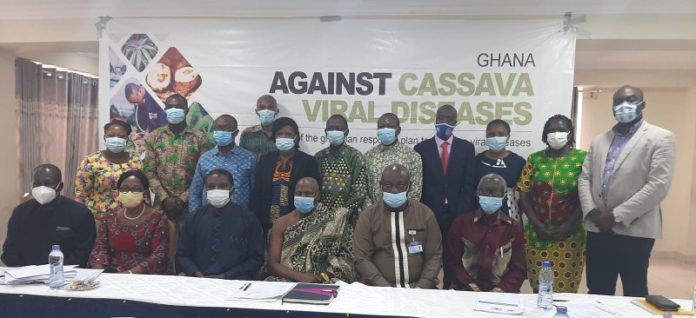The Crops Research Institute (CRI) of the Council for Scientific and Industrial Research of Ghana (CSIR) has engaged stakeholders in the food industry on Ghana’s response plan against cassava viral diseases to improve yield.
The meeting was to enhance the understanding of key stakeholders on the health and economic importance of cassava, the viral diseases affecting the crop, and measures to adopt to eliminate and control them.
Representatives from CSIR-CRI, Foreign Commonwealth and Development Office (FCDO), United Nations Industrial Development Organisation (UNIDO), Plant Protection and Regulatory Services Directorate (PPRSD) of the Ministry of Food and Agriculture (MoFA), Alliance for a Green Revolution in Africa (AGRA), the University of Cape Coast (UCC) and Kwame Nkrumah University of Science and Technology (KNUST) attended the meeting.
Dr. Moses Mochiah, Director of CSIR-CRI, in a welcome address, said cassava is an important crop as it provided food for nearly 800 million people worldwide, including 500 million Africans and some 25 million Ghanaians.
He said the crop’s resilience makes it a strategic one for food security and poverty reduction since its derived products such as gari, tapioca, fermented dough, flour, starch, and chips, amongst others, helped to boost sub-regional trade.
Despite its importance, Africa, the world’s largest cassava producer, had the lowest yields compared to other continents as cultivation of the crop was impeded by several constraints, including viral diseases.
Dr. Mochiach said African Cassava Mosaic Disease (CMD) and Cassava Brown Steak Disease (CBSD) constituted the most eminent restrictions to cassava production due to their geographical distribution, resulting in an annual economic loss which is estimated at two to three billion dollars in Sub-Saharan Africa alone.
He said the recent spread of CBSD from East Africa into Central Africa and the threat it posed to West Africa was a great concern because it could lead to yield loss of up to 90 percent or more.
These two viral diseases are transmitted by whiteflies, which are abundant in Ghana and disseminated by humans through the exchange and use of infected planting materials.
He said the havoc that the diseases could wreak on cassava production necessitated the meeting to discuss the response plan and the role of key stakeholders.
He expressed the hope that the response plan and its implementation would receive support and cooperation from stakeholders to contribute to Ghana’s effort in controlling the disease.
Dr. Allen Oppong, a Senior Research Scientist at CSIR and Ghana’s leader of the West Africa Virus Epidemiology (WAVE), who presented the objectives and outputs of the plan, said out of the two viral diseases, the most prevalent in the country was the African cassava mosaic viral disease.
He said the cassava mosaic disease varied from country to country, including, Cameroon, South African, Ivory Coast, and Ghana.
Any of these varied types have a serious effect on the cassava crop and result in about 20 to 40 percent loss in yields.
Dr. Oppong said although the cassava brown steak viral disease was not yet in Ghana, there was a need for stakeholders to prepare for its control to prevent the devastating effects on cassava production.
He said farmers often did not know the symptoms of the cassava viral diseases and indicated that the Ghana cassava response plan spelled out elaborate education of farmers to raise awareness of the diseases.
It would also help to promote the highly resistant cassava crops produced out of research to farmers as a measure to control the viral diseases.
Dr Oppong said the key structure of the response plan when accepted by all key stakeholders would be the setting up of an Emergency Operation Centre (ECO) to facilitate all activities towards a quick response against the cassava viral diseases.
Nana Fobi Kropa, the Chief of Atwimanim, who chaired the function, noted that cassava provided food and jobs for many Ghanaians, and therefore, commended stakeholders for the response plan to improve cassava production.








